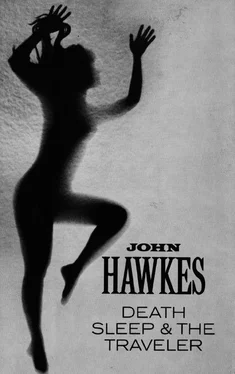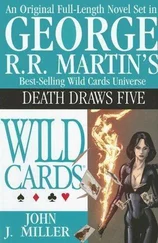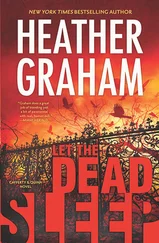We passed behind a high box hedge. The bay was concealed behind a wall of cypresses each of which was strangled in a thick climbing growth of roses. The shadows of palm fronds swept before my face like cobwebs. We emerged from our moment of gloom, the hearselike carriage canted upward. The ship was still there.
“Give me a handkerchief or something,” said the wireless operator, “I’ve spilled the wine.”
I watched the wireless officer holding the opened bottle of wine at arm’s length while Ariane brushed and dabbed at the long wet crimson stain that dribbled down the full length of his tunic. One brass button was an island of gold in the vivid stain. Slowly he returned the mouth of the bottle to his narrow lips.
For the occasion of this day’s excursion Ariane was wearing a purple and oddly ruffled silk shirt tucked snugly into her familiar blue denim pants. She was also wearing a pair of inexpensive dark glasses with black lenses and thick white frames that masked the small upper portion of her face and skull and hid her eyes. Between the ruffles of the partially opened blouse the tops of the naked breasts were more than usually visible, and now, as she stuffed the straw bag once more between her feet and put her hand on my knee, again I noted the tightness of her skin and the little field of freckles spread childishly across her breasts.
“Allert,” she murmured above the sound of the shaggy hooves, “so silent, Allert?”
“Yes, today I am silent.”
“You are displeased. But why this displeasure, Allert?”
“I dislike sight-seeing. I dislike captive animals. Today I’m a reluctant companion.”
“But this is a famous, beautiful zoo filled with the softest, loveliest creatures in the entire world. Don’t you take your children to the zoo?”
“We are without children, Ariane. It is one of the things I appreciate about our cruise, the absence of children.”
“That is a sad thought, Allert. Very sad.”
“If I had my way,” said the wireless operator all at once, and passing the wine bottle to Ariane, “I’d pack the cruise with children. Hundreds of children. I love the little tykes myself.”
“So do I,” whispered Ariane, apparently choosing to ignore the obvious truthlessness of the young man now managing to put his arm around her slight damp silken shoulders.
“Perhaps the two of you will be able to study some infant animals while I eat an ice.”
“Allert,” Ariane said then, “be kind.”
So I accepted the proffered wine bottle, drew my shoulder away from the young officer’s intrusive hand which, I knew only too well, was applying insistent pressure on the upper portion of Ariane’s arm. He was dressed in white, as usual he was slouched in the carriage with one foot propped high and his free hand lolling on the shiny black tin fender. Ariane was sitting stiffly between us with her eyes downcast and her slender wet back primly distant from the uncomfortable texture of the old leather seat. Yes, she was sitting primly and silently between us but nonetheless was succumbing breath by breath to the pressure of the wireless operator’s seductive hand. I shifted again, I smelled the dust and leather of the hired carriage and the heavy aroma of the old unkempt horse.
Again the ship appeared, framed suddenly in a mass of rich mimosa. The wireless operator began to drum his fingers on the tin fender. His wine was swelling inside me like a red cloud.
And then we arrived, we reached the top of the hill, we clattered through the faded painted gates of the famous zoo. We rolled to a stop in the vast spotted shade of an army of diseased umbrella pines, and now even the unfamiliar worlds of impersonal ship and nameless little tourist city were gone. We descended from the carriage, we instructed the old driver to await our return. Ariane recovered some of her earlier glee and sped off in her tight blue denim pants and her passionate purple blouse toward the nearest cages. There was no one else in sight. There was not one child in that entire zoo, only the winding paths, the heavy shade, the dust, the smells of animal waste, the cages that always appeared empty until, after a moment or two of patient scrutiny, some small face would emerge pressed to the mesh, or some strange little body would stagger out of a heap of wet straw on gemlike feet. And overhead there was always the high roof of the diseased umbrella pines.
Ariane was fully recovered. She could not move quickly enough from cage to cage. She laughed, she sighed, she exclaimed over the curve of some pathetically small pair of dusty horns, she pressed her little tight freckled breasts to the bars. And at each cage I stooped and read aloud the Latin inscription concerning the little mangy malformed animal within.
“Well,” said the wireless operator under his breath as we trailed behind our delighted Ariane down a cracked clay path beneath the pines, “well, it’s just the place for an old colonialist like you. We ought to lock you up with that frigate bird over there.”
I did not reply. I did not challenge the belligerence of the wireless operator. Ears flickered in the shadows, I heard the sudden hiss of urine, a small red naked face appeared ready to burst. And the straw, the rust, the scatterings of gray feathers, the piles of bare bones, the droppings, the distant cry of some furry animal, the great round luminous eyes of an old stag collapsing and sinking rear end first into a pool of slime — here, I thought, was the true world of the aimless traveler, and in this hot garden of captivity the disreputable young man at my side was at home, it seemed to me, and harmless.
“Allert,” called Ariane, who was now out of sight around a curve in the path, “come and see what I have discovered!”
In another moment or two the wireless operator and I rounded a curve in the path, emerged from a sheltering screen of scaly pine tree trunks, and entered a long unpainted single-storied building of weathered wood. It was the reptile house, a fact which prompted from the sauntering young ship’s officer a few more unpleasant remarks about men who assumed reptilian roles in their old age. From the entrance at one end to the exit at the other, it consisted of a single rectangular room that to me suggested an old dance hall lined on either wall with unimaginative displays. The light was poor, the place was empty except for the three of us, on the dead air was a smell that I recognized at once as belonging only to the reptile houses in the zoos of childhood and, further, as having been secreted through the waste ducts of rodents and cold-blooded creatures lying in dry coils. The smell was like that of venom or urine or black ink in a context of crushed peanuts.
“Hurry,” called Ariane, who was standing alone and small at the far end of the building, and who was calling to us and waving us on, “hurry, Allert, and see what I have found!”
The wireless operator joined our happily exercised companion immediately, while I in my worsening mood, angry at Ariane’s unexpected display of bad taste, proceeded slowly down the length of the right-hand side of the reptile house, pausing from time to time as if seriously interested in a pair of discolored fangs or as if intrigued by the injury apparently sustained by the python.
“Come on, Vanderveenan,” called the wireless operator, who was now encircling Ariane’s waist with his arm and squeezing her slight laughing body against his crumpled uniform, “here’s a special sight just for you!”
The approaching encounter in the reptile house was unavoidable, I knew, and so to proceed beyond discomfort or humiliation with the least possible delay, I turned from the all but inaudible piping of some desert animal no larger than my hand and rising on its hind legs like an emaciated miniature kangaroo, and took my place on the other side of Ariane, who was still laughing and still caught in the partial embrace of the young man with whom, in my presence at least, she had never been so familiar.
Читать дальше












